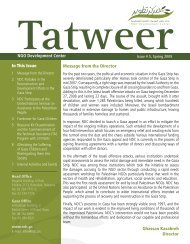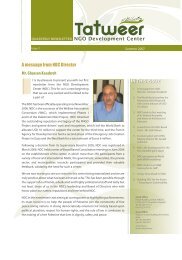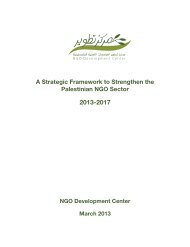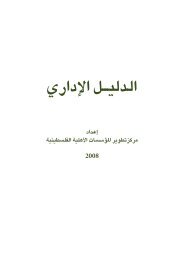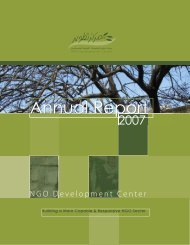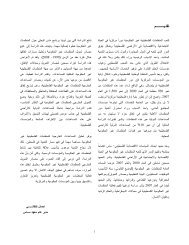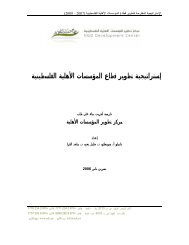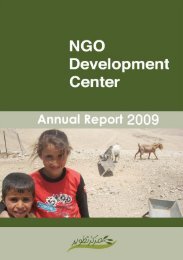Tracking External Donor Funding.pdf - NDC
Tracking External Donor Funding.pdf - NDC
Tracking External Donor Funding.pdf - NDC
Create successful ePaper yourself
Turn your PDF publications into a flip-book with our unique Google optimized e-Paper software.
4. Reflections and Policy Recommendations<br />
It has been the objective of this study to produce a<br />
comprehensive review of the external finances absorbed<br />
by the Palestinian NGO sector. Neither the above<br />
research nor the following recommendations include any<br />
discussion of whether these organizations have achieved<br />
their stated objectives; no evaluation or judgment has<br />
been made regarding the effectiveness of the aid received<br />
by the Palestinian Territories. By way of conclusion, we<br />
will outline the problems associated with the<br />
unavailability of PNGO financial data and end by<br />
recommending a potential means of overcoming these.<br />
4.1 The Absence of Data, Policy<br />
Harmonization and Transparency<br />
In response to the Paris Declaration on Aid<br />
Effectiveness, the MoP crated the PAMS system for<br />
tracking external finances. This database, however, is<br />
still unable to capture a genuinely accurate picture of aid<br />
flows to both the governmental and non-governmental<br />
sectors in the WB&GS. Often, smaller organizations<br />
with budgets of less than a million US dollars are<br />
overlooked by PAMS. Yet are research demonstrates that<br />
small budgets can quickly accumulate, and thus grow,<br />
into significant sums deserved of our attention.<br />
An obvious consequence of the limitations inherent in<br />
the PAMS system is a lack of coordination between nongovernmental<br />
and governmental organizations operating<br />
within the Palestinian Territories. This lack of<br />
harmonization between sectors has, on occasion, resulted<br />
in poor communication between donors, PNGOs and the<br />
PA or even direct duplication of services or projects; a<br />
reality that may have challenged the legitimacy of<br />
collective and long-term development strategies.<br />
It is clear, therefore, that a lack of transparency regarding<br />
the finances and activities of PNGOs has helped to<br />
prevent effective policy harmonization. Moreover, an<br />
unwillingness to disclose this information may well have<br />
restricted the effectiveness of the non-governmental<br />
sector in general. Only through an increase in the level of<br />
transparency can a harmonized and collective<br />
development strategy be forged. Unless all parties are<br />
made aware of what development aid is being spend on,<br />
successful policy coordination will remain allusive;<br />
harmonization cannot be achieved without reference to<br />
an accurate picture of the totality of development efforts.<br />
It must be noted, however, that achieving greater<br />
harmonization is not as simple as it initially sounds.<br />
Efforts must be made to balance the need of greater<br />
transparency with the needs of PNGOs to maintain the<br />
autonomy and flexibility which they require to do the<br />
work that they do. Both local and international NGOs are<br />
often unwilling to reveal the sources and destination of<br />
their finances. It may be the case that many local NGOs<br />
would be unwilling to participate in any effort to increase<br />
transparency without first being assured of their<br />
continued right to operate in a manner they deem<br />
necessary and serve the constituencies they choose.<br />
4.2 Policy Recommendation: NGO Project<br />
Database<br />
It is for the above reasons that this study recommends the<br />
development of a database capable of accurately tracking<br />
aid flows to PNGOs; a database superior to those that<br />
already exist. Such a database could be made available to<br />
governmental and non-governmental organizations both<br />
within and outside of the WB&GS. Care would have to<br />
be taken, however, to manage access to this database. It<br />
would be essential that it did not become viewed as an<br />
encroachment into the rights of the nongovernmental<br />
sector by the PA instead of a move towards mutually<br />
beneficial harmonization.<br />
4.3 Potential Benefits of the Proposal<br />
Our research suggests that a database of this sort would<br />
have some clear and tangible benefits. Most importantly,<br />
it would allow policy-makers, project managers and<br />
researchers to build a broad and accurate picture of the<br />
financial resources that are entering the Palestinian<br />
Territories, the origins of these resources, what they are<br />
being spent on and where they are being spent. Improved<br />
transparency and increased access to data regarding the<br />
finances and activities of PNGOs and their international<br />
counterparts would allow for a harmonization of<br />
development strategies between governmental, nongovernmental<br />
and international organizations. In turn,<br />
this would allow for greater coordination, a far more<br />
efficient distribution of resources and increased “value<br />
for money” for both Palestinian citizens and international<br />
donors alike. <strong>Donor</strong> states and organizations, for<br />
example, would be able to better assess the impact of the<br />
finances they provide and make superior decisions<br />
regarding which organizations to financially support.<br />
Likewise, the collated data could be employed be<br />
researchers and academics to evaluate the role that<br />
NGOs play in Palestinian development and the value of<br />
their development strategies to the Palestinian economy<br />
and the wider society. Any lessons learned from such<br />
63


